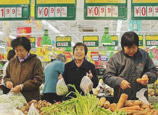
They also planned to push for cooperation in areas from mining and agriculture to infrastructure construction and tourism, and vowed to support young people to learn in each other's country.
There are around 150,000 Chinese students studying in Australia. Mandarin is the second most common spoken language in Australia, after English. The Chinese community in Australia numbers more than 900,000.
China is Australia's largest trade partner while Australia is China's seventh-largest trade partner. Bilateral trade hit $122.3 billion in 2012, up 4.9 percent year-on-year after a surge of 32.1 percent in 2011, according to the General Administration of Customs.
"There are conditions, and (more important) there are demands, to deepen China-Australia cooperation," Li said.
He called for the two sides to "direct the efforts toward the same goal".
Gillard said her country wants to deepen mutual trust with China.
Gillard arrived in Hainan province on April 5 to attend the Boao Forum for Asia Annual Conference.
She told President Xi Jinping when they met on Sunday in Hainan that Australia wants to be a reliable and stable resource provider for China.
Su Hao, a professor at China Foreign Affairs University, said the importance Gillard attaches to Beijing shows that "Australia is actively clearing up the obstacles in its relations with China".
Su said that although Canberra has cooperated with Washington's pivot shift to the Asia-Pacific region, it has defined itself as an Asian country while realizing that China is an important nation in Asia.
Gao Cheng, a researcher from the National Institute of International Strategy at the Chinese Academy of Social Sciences, said China-Australia trade will expand due to their complementary economies.
"It's sure bilateral trade will keep expanding as China will demand more natural resources from Australia in the future. Meanwhile, Australia is eager to tap the huge Chinese market and benefit from China's fast economic growth," she said.
"Gillard's high-profile visit and the direct trading of the two currencies are positive signs of improving political bilateral ties," Gao said.
 |
















 Stand in face of bulldozer
Stand in face of bulldozer
With water and electricity cut, lonely 'Nail House' struggling to stay


![]()
